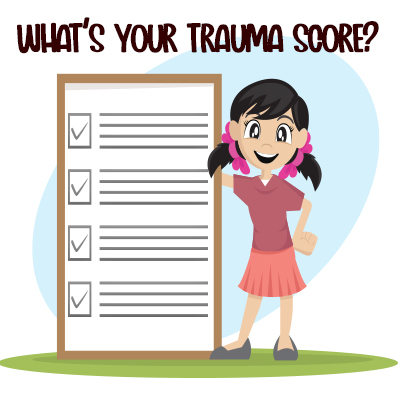Do you know the origin of your autoimmune disease? How has your body kept the score for your trauma?
Dr. Bessel van der Kolk writes in his 2014 book “The Body Keeps the Score”, he explains how trauma is relived in the body long after the traumatic event is experienced. His research shows how these bodily symptoms show up in the way a person sits or breaths, the way they hold themselves, their sleep patterns, and their overall digestion.
In his work “The body keeps the score,” van der Kolk focuses on traumatic stress as the root of neuroscience. Traumatic stress changes the functional, chemical, and emotional function of the brain, specifically the limbic area and brain stem. The hyperactive status of the amygdala triggers the release of stress hormones and hinders the hippocampus function, causing traumatic memories to remain vivid. When the prefrontal lob function is deactivated due to stress, there is a decline in the ability to balance the stress hormone, which causes panic, agitation, and hypervigilant responses. Dr. Bessel van der Kolk explains, “If a child grows up having to deal with the rage of their parents, they will learn to stifle their own anger and desire to retaliate against those that have hurt them. While for survival, they get good at monitoring the moods of others, they also become very still and quiet so as not to open themselves up to the anger or retaliation of their parents. How might trauma show up in the bodies of these children? Traumatized people tend to have bodies that are hyper-alert, responding to breath and touch by flinching and bristling at contact, they might also shut down and become numb.
What happens to the physiology of the brain when trauma is experienced?
Have you heard the term fight or flight? As humans, we are equipped with automatic responses that help us survive. When a person feels stressed or experiences a traumatic event, the body discharges chemicals called cortisol and adrenaline to help the body have what it needs to either fight or flee. This is the body’s automatic reaction to stress and trauma, and it is beyond our control.
Changes the body may go through when stress and trauma are present:
- Feeling dead inside or lacking interest in things you once loved.
- Feeling the need to fight against the perpetrators of the traumatic event.
- Fleeing from the situation that causes stress or the traumatic event.
Dr. van der kolk goes on to say that bodily and brain changes from emotional and physical trauma can be present long after the event(s) and can influence one’s psyche and body, including thoughts, and feelings.
Common symptoms of trauma might include:
- Flashbacks of the traumatic event where the body doesn’t recognize the time-space continuum and behaves as though the event is happening now
- Unexplained feelings of anxiety or feelings of dread.
- Splitting where your brain and body separate as a psychological mechanism to tolerate difficult and overwhelming situations. This makes it easier to manage the emotions that they are feeling, which on the surface seem to be contradictory.
- Disassociation is the way your brain manages overwhelming pressure
- Hyperarousal shows up with feeling restless, nervous, and the inability to relax
- Insomnia is often a symptom of trauma where a person may feel that the unconscious state of sleep is unsafe
The immune system is sensitive to stress with the stress hormone, cortisol. Cortisol has the most influence over your immune system and its general purpose is to balance the immune function. When stress is severe or prolonged, the cortisol control over the immune system can be permanently impaired, which leads to increased inflammation. Inflammation is linked to a range of diseases and disorders, including autoimmune disease, heart disease, and diabetes.
When stress is pervasive, prolonged, and extreme, the body reacts by resisting the production or effects of cortisol which causes inflammation. Increased inflammation, changes in gut microflora, and a genetic predisposition can lead to autoimmune diseases.
Below are a few autoimmune diseases that have been directly related to stress and trauma:
- Type 1 diabetes affects the pancreas and insulin which can damage blood vessels and organs like the heart, kidney, eyes, and nerves.
- Rheumatoid arthritis (RA) is when the immune system attacks the joints.
- Psoriasis/psoriatic arthritis when skin cells develop too quickly, creating inflamed and itchy red patches
- Multiple sclerosis
- Systemic lupus erythematosus (SLE)
- Inflammatory bowel disease (IBD)- Chron’s disease and Ulcerative colitis
- Addison’s disease affects the adrenal glands with symptoms of weakness, fatigue, weight loss, and low blood sugar.
- Graves or Hashimoto’s disease both attacks the thyroid and can cause symptoms of bulging eyes and weight gain, sensitivity to cold, fatigue, and hair loss, respectively.
- Lichen Planopilaris (LPP) a rising autoimmune disorder that affects the hair follicles causing permanent hair loss.
Understanding the correlation between trauma and its effect on the body paves the way for new treatments for emotional unwellness. Rachel Graham shares her trauma story and its relationship with an autoimmune disease to normalize the mental health discussion. Contact her today.

